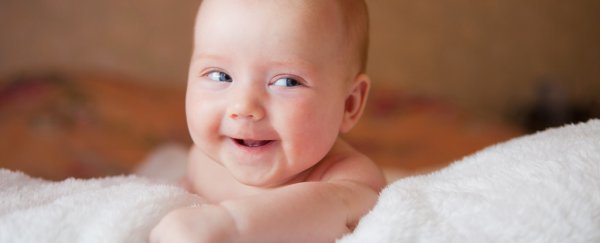Babies and other newborn animals aren't just amazingly cute by accident – the cuteness on show is actually crucial for their survival, and is intended to trigger vital caregiving behaviours.
That's probably not news to anyone, but researchers from the UK say those triggers go way beyond the physical appearance of cuteness. Based on a massive review of what we know about our sense of cuteness in infants, positive infant sounds and smells are also involved.
According to the researchers from the University of Oxford, there's something else going on besides simple triggering of care-giving behaviours, which could explain why both parents and non-parents are wowed by a cute infant. Feelings of empathy and compassion, as well as a facilitating of social relations, might also be involved in our compulsion to pamper babies with care.
Take that infectious baby laugh, for example. "Infant laughs and babbles are examples of what has been called 'auditory cuteness', where the infant's well-stretched vibrating vocal membrane produces mostly high frequency and pure tone-like sounds that attract caregivers across many bird and mammalian species," the researchers write in Trends in Cognitive Sciences.
And while we might not always associate babies with producing pleasing smells, the researchers point to a 1983 study in which olfactory cues - or scents - were found to help strengthen the bond between mother and baby.
Looking at dozens of published studies, the team thinks this broader concept of cuteness has a more complicated effect on our brains than previously realised.
Not only does it provoke a fast and immediate caregiving response, it also causes a slower and more long-term reaction, they suggest. This could be a willingness to engage in play, or a growing sense of empathy over time.
"Caregiving involves a complex choreography of slow, careful, deliberate, and long-lasting prosocial behaviours, which ignite fundamental brain pleasure systems that are also engaged when eating food or listening to music, and always involve pleasant experiences," the researchers write.
The same effect was noted across genders, and across parents and non-parents – so other family members like uncles and aunties are drawn in as well.
Cute sights, sounds, and smells can go beyond an initial burst of caregiving to "promote other sophisticated behaviours" – the example the researchers give is the photo of a young Syrian child lying dead on a beach, which appeared to change many well-established attitudes to the refugee crisis in Europe.
"Like a Trojan horse, cuteness opens doors that might otherwise remain shut," they write, in this case counteracting dehumanising and xenophobic attitudes.
The team is now moving on to look at how becoming a parent affects our brains – something that may well link back into our response to infant cuteness.
"Anecdotally, we become more interested in everything to do with babies but how does it change our brains?" lead researcher Morten Kringelbach told ScienceAlert via email. "Also, how do our brains react to other cute stimuli like puppies and kittens. Are they treated more like babies or like adult animals?"
The research continues, but the next time you're tempted to pick up a cute, babbling baby, just remember that it could be affecting your brain in ways you don't even realise.
